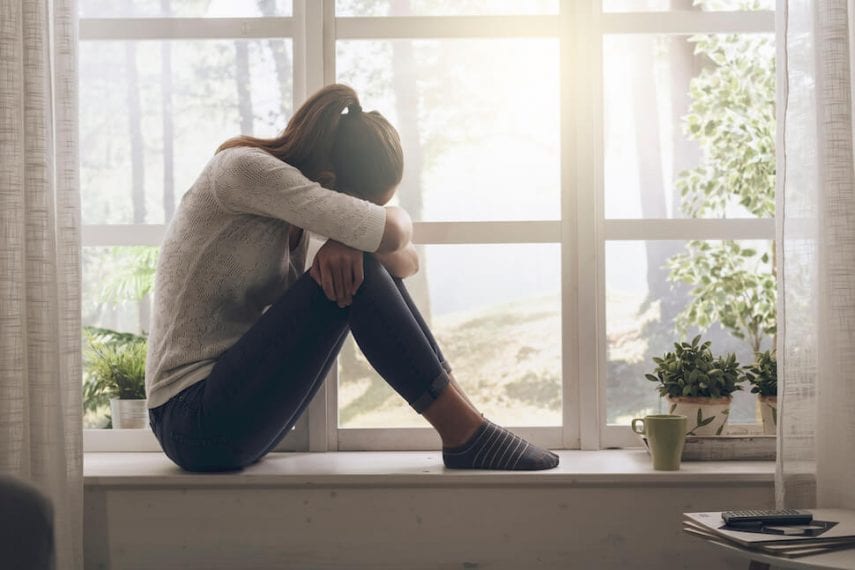Overcoming the Death of a Spouse: When Complicated Grief Becomes Debilitating

Complicated grief is a difficult condition that some people develop after the loss of a loved one. In many ways it resembles normal grief, but unlike a healthy bereavement process it tends to get worse with time and persists for several months or even years. Losing someone very close, such as a spouse, increases the risk of complicated grief. If you have passed a typical grieving period and still cannot function or find any relief, consider getting a mental health evaluation and professional treatment.
Grief is a universal experience. It is one of the most difficult emotional journeys anyone will take. When you lose someone as close to you as a spouse, that grief may seem insurmountable. In spite of the devastation of this loss, it is normal to eventually recover and be able to function again.
Everyone has a unique experience and will take varying amounts of time to come to terms with the death of a spouse, but it is not typical to still experience intense grief a year or more later. If you do, you may be struggling with a diagnosable and treatable mental illness known as complicated grief disorder. By taking proactive steps to heal, you can overcome this and enjoy life again.
Understand the Difference – Grief vs. Complicated Grief
Overcoming such a big loss is no small task, but it helps to be aware of your process, symptoms, and reactions. Are they normal, expected grief? Or have you developed a mental health condition? Studies indicate that about seven percent of people in bereavement will develop complicated grief.
What largely distinguishes this from healthy grief is duration. The symptoms are similar, but with complicated grief they persist, and even get worse, for a year or longer:
- Intense sadness and pain
- Intense longing for the deceased
- Inability to focus on other things
- Difficulty accepting that your spouse is gone
- A feeling of detachment from your life and from others
- Feeling life has lost all meaning and purpose
- Wishing you had died with your spouse
- Difficulty proceeding with normal activities and functions
Knowing you have this condition is not easy. It’s difficult to be self-aware, so you may need to listen to loved ones. Consider Miriam’s story:
“When my husband died from cancer, I expected to be prepared. He was sick for so long. But the loss devastated me. I felt alone but didn’t even want my family around, not even my adult children. I tried going back to work, but all I could think about was my husband. I couldn’t get anything done.
After a couple of months, my oldest daughter suggested that I wasn’t processing the loss normally. I didn’t listen, but a few months after that a friend said the same thing. I decided to see my doctor for a professional opinion, and she agreed with my family that my struggles weren’t healthy or normal. I admitted that I felt so guilty about his loss, that I should have pushed for more treatment. I got a diagnosis of complicated grief and, thanks to my loved ones looking out for me, I went through treatment. Although the loss still stings, I have been able to find joy in my family again.”
Getting Treatment for Complicated Grief
Typical grief sometimes feels as if it will never end, but it does get better. With support from loved ones and good self-care, your terrible symptoms should lessen and become less severe. But complicated grief is a mental illness, and that means it won’t just go away. To resolve your feelings and return to some sense of normalcy, you need professional treatment.
A residential facility can provide comprehensive, individualized, and expert care while giving you the chance to step away from home responsibilities to focus on healing. Therapy is the focus of care for complicated grief, but it requires a professional trained in grief and trauma.
While a death does not have to be exceptional to trigger this condition, many of the symptoms of complicated grief are similar to those of trauma disorders. The loss of your spouse may be traumatic for you, and the right kind of therapy will help you overcome it. Trauma grief therapy will help you face painful feelings and memories in a safe environment so that you can put them in perspective and learn to cope in healthier ways.
Rely on the Support of Others
Social support is an important part of healing for all types of mental health issues. A risk factor for normal grief developing into complicated grief is the lack of a good support system. Having a close group of friends and family to rely on offers both protection from complicated grief and a way to heal.
Before, during, and after treatment, rely on your support system. Let them be there to listen to your experiences and emotions. Allow them to just be around you even if you don’t feel like talking. Also helpful is a support group where you can talk and listen to others with similar experiences. This was useful for Jim after the death of his young wife:
“I lost my wife in a car accident. She was only 26 years old, which made it seem so unfair. We had just started our lives together, and I couldn’t get over the tragedy of it. I grieved for months before I realized I needed help. I had gotten to a point where I could go to work and go through the motions, but at home I stayed isolated and drank too much.
I agreed to residential treatment when my parents pushed for it, but it was hard for me. I have never liked opening up to other people, and as a man I definitely felt like I should be strong and not show emotion other than getting angry over the unfairness of the situation.
What really surprised me about treatment was how easy it was to share with other residents once I got started. The daily support group for bereavement became the best part of my day. My therapist was great, but I really think the opportunity to live with and heal with other people made the difference. After I came back home, I found a support group immediately. I also started opening up to my parents about what happened, something I never would have considered before.”
Call for a Free Confidential Assessment.
877-727-4343Continue Practicing Self-Care
Diagnosis and treatment are essential for healing from complicated grief. These serve as the foundation of your transition from devastation to enjoying life again. Couple that with social support and you have the best recipe for getting better.
It’s important to remember, though, that you may need ongoing care. Think of continuing with outpatient therapy as a tune up. You may slide into a depression over your lost spouse despite progress you made in treatment.
Carrying on with therapy is just one aspect of taking care of yourself during this difficult time. It’s also important to practice good mental health in general, which means taking time out to do things you enjoy; taking steps to reduce and manage stress; and finding time for meditation and other healthy coping strategies. Physical health is important, too. Eat well, exercise regularly, and get plenty of sleep.
Prepare to Meet New People
No one expects you to develop a new relationship after the loss of a spouse on any timeline other than your own. But part of the healing process is to move forward with all aspects of your life. By meeting new people, and even starting to date, you are not being disloyal. You are recovering from grief and entering the next stage of your life.
Take this at your own pace, and start slowly if you need to, by making new friends. Having your close support group is great, but meeting new people and developing friendships is a positive way to make progress. Try things like joining a gym and taking fitness classes, learning a new hobby or joining community groups, going to church or other religious meetings and clubs, or even making new friends at work. Being social will be hard at first, but it is a step in the right direction.
When you lose your spouse it may feel like you have lost everything. The death of someone so close is bound to cause intense emotions and severe grief, but even so, you should be able to heal with time. If you simply cannot cope, take the step to get additional support and professional care. It is possible to overcome this, even if it feels impossible right now.
Bridges to Recovery offers comprehensive treatment for people struggling from complicated grief and other mental health issues and co-occurring substance use disorders. Contact us to learn more about our renowned Los Angeles programs and how we can help you or your loved one start on the path to lasting wellness.






